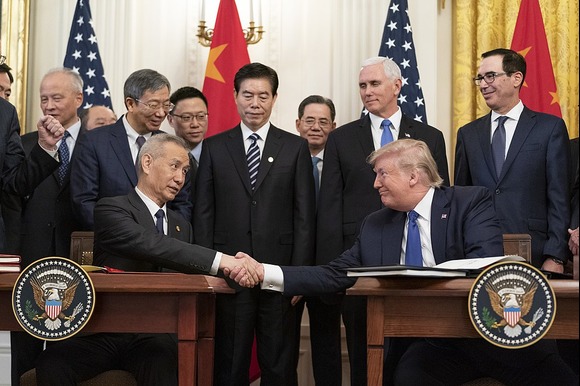US is set to reduce the ‘de minimis’ tariff rate on low-value shipments from China from 120 per cent to 54 per cent, along with implementing a flat fee of $100 per package, according to a newly issued executive order from the White House released on Monday (local time). The policy will take effect on May 14.
This decision comes just a day after the US and China concluded a round of trade negotiations in Geneva, where both sides agreed to a 90-day pause on a range of previously imposed tariffs that had escalated trade tensions. As part of this temporary truce, the two countries agreed to make sweeping tariff cuts. The United States reduced its overall tariffs on Chinese imports from 145 per cent to 30 per cent, while China lowered tariffs on US goods from 125 per cent to 10 per cent.
Previously, under the de minimis exemption rule, shipments valued at $800 or less and sent from China via postal services could enter the US without incurring any duties or undergoing substantial inspection. This loophole had been extensively exploited by Chinese e-commerce platforms such as Shein and Temu, as well as traffickers transporting illicit substances like fentanyl.
The de minimis exemption was revoked in February when President Donald Trump signed an order imposing a 120 per cent tariff on low-value shipments, or a flat fee of $200 per package—whichever was higher. That measure had been set to take full effect in June. The updated executive order now revises that rate downward to 54 per cent, while setting a fixed $100 charge per shipment.
What is the De Minimis Rule?
The de minimis rule, which originated in 1938 and is governed by Section 321 of the Tariff Act of 1930, permits the duty-free entry of goods valued at $800 or less per shipment. This regulation simplifies customs procedures for low-value imports, allowing goods to be brought into the United States without formal customs declarations or tariffs.
For years, the rule enabled Chinese online retailers like Shein and Temu to sell products at highly competitive prices in the US market by avoiding added tariff costs. However, with the de minimis exemption now eliminated, most goods imported from China are subject to steep tariffs, placing pressure on the low-price models these companies had used to gain traction among American consumers.
In response to the regulatory changes, both Shein and Temu have scaled back their advertising campaigns in the US and begun to expand their focus to other markets, notably in Europe. Meanwhile, Amazon has launched a competing service, Amazon Haul, which debuted last week in the UK and Saudi Arabia, targeting the same budget-conscious consumer demographic.
How Chinese E-Commerce Firms Adapted to Rising Tariffs
As tariffs climbed, companies like Shein and Temu adjusted their business models to maintain their US presence. Rather than shipping individual orders directly from Chinese factories to American buyers, both firms began importing products in bulk and storing them in US-based warehouses to streamline domestic fulfillment.
Temu, in particular, announced that effective May 2, all of its US sales would now be processed through locally based sellers. A Reuters report confirmed that Temu had shifted away from its factory-to-consumer model and started highlighting products already stocked in the US.
At the same time, air freight traffic between China and the United States has dropped, reflecting the broader disruption to direct cross-border shipments caused by the new tariffs. As trade policies evolve, both governments and companies appear to be recalibrating their strategies to navigate the new commercial landscape.






